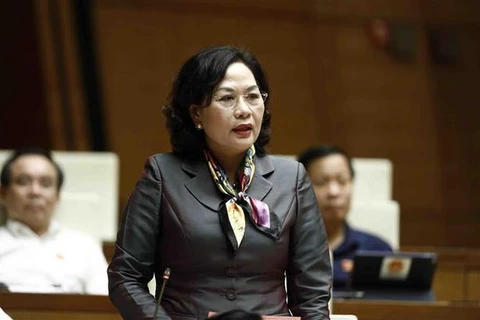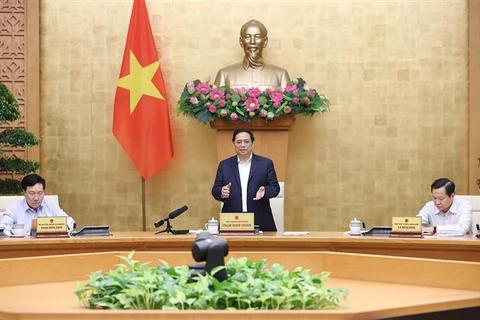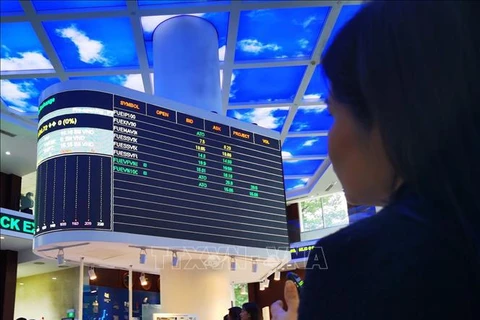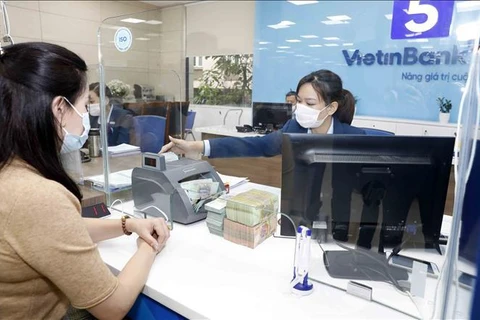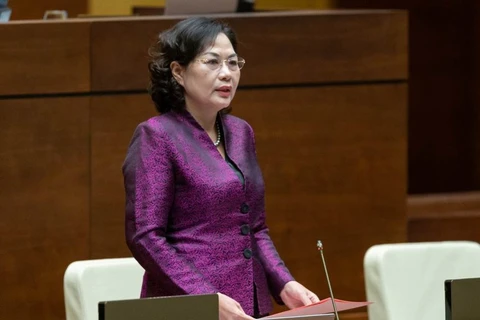Hanoi (VNA) – Amid the US Federal Reserve (FED)’s continuous increases of interest rates to cope with inflation, the most important task for Vietnam now is to keep macro-economic stability, with monetary stability being the core, some economic experts have said.
Expert Nguyen Tri Hieu said when FED continues to hike interest rates, exchange rates in Vietnam will also go up accordingly. The USD/VND exchange rate has climbed due to the appreciation of the US dollar, which is favourable for export but unfavourable for import.
Expert Dinh Trong Thinh held that facing the FED moves, the first and foremost thing is to keep macro-economic stability, with monetary stability being the core. If the USD/VND exchange rate is maintained at an appropriate level, core inflation will stay low, thus curbing goods price hikes and ensuring that the consumer price index (CPI) will grow at a slow pace from now to the year’s end and even the following years.
To maintain appropriate exchange rates, the State Bank of Vietnam (SBV) has been making interventions through different measures, including selling the US dollar. With relatively abundant forex reserves, the SBV has sufficient resources to intervene in the market to sustain appropriate exchange rates.
In the long term, the US dollar value will become stable soon, Thinh said, noting that appropriate exchange rates will ensure stable core inflation, thus completely enabling the achievement of keeping overall inflation at less than 4% and ensuring economic growth.
The Vietnamese dong’s daily reference exchange rate against the US dollar has soared by 7% compared to the end of 2021, which means the dong has lost its value by 7%. However, the depreciation in comparison with the US dollar is the common trend among currencies in the world, and in fact, the Vietnamese dong is recording less depreciation.
SBV Governor Nguyen Thi Hong said the international situation is causing pressure on not only Vietnam but also all countries around the world. In the recent past, the SBV has made highly proactive and timely response, and thanks to that, the market has seen positive developments and market psychology has been stabilised.
In the time to come, one of the important issues is that the SBV, as well as ministries and sectors, have to stay proactive, increase forecasting and analysis, continually update themselves with new changes so as to ensure proactive governance, and harmoniously coordinate existing policies.
The Prime Minister has ordered public investment be strongly promoted and an expanded and focus-driven fiscal policy be implemented, which will ease pressure on the banking system’s credit, according to Hong.
The SBV will stay persistent in the monetary governance measures aimed at stabilising the macro-economy, but “stable doesn’t mean fixed”, she said, adding that it will keep a close watch on every development to take appropriate actions.
The central bank will govern foreign exchange rates in a way that concurrently makes room for the rates to fluctuate flexibly and absorb external shocks, and intervenes in the forex market to minimise exchange rates’ excessive fluctuations, thereby helping stabilising the forex market, according to the official./.
Expert Nguyen Tri Hieu said when FED continues to hike interest rates, exchange rates in Vietnam will also go up accordingly. The USD/VND exchange rate has climbed due to the appreciation of the US dollar, which is favourable for export but unfavourable for import.
Expert Dinh Trong Thinh held that facing the FED moves, the first and foremost thing is to keep macro-economic stability, with monetary stability being the core. If the USD/VND exchange rate is maintained at an appropriate level, core inflation will stay low, thus curbing goods price hikes and ensuring that the consumer price index (CPI) will grow at a slow pace from now to the year’s end and even the following years.
To maintain appropriate exchange rates, the State Bank of Vietnam (SBV) has been making interventions through different measures, including selling the US dollar. With relatively abundant forex reserves, the SBV has sufficient resources to intervene in the market to sustain appropriate exchange rates.
In the long term, the US dollar value will become stable soon, Thinh said, noting that appropriate exchange rates will ensure stable core inflation, thus completely enabling the achievement of keeping overall inflation at less than 4% and ensuring economic growth.
The Vietnamese dong’s daily reference exchange rate against the US dollar has soared by 7% compared to the end of 2021, which means the dong has lost its value by 7%. However, the depreciation in comparison with the US dollar is the common trend among currencies in the world, and in fact, the Vietnamese dong is recording less depreciation.
SBV Governor Nguyen Thi Hong said the international situation is causing pressure on not only Vietnam but also all countries around the world. In the recent past, the SBV has made highly proactive and timely response, and thanks to that, the market has seen positive developments and market psychology has been stabilised.
In the time to come, one of the important issues is that the SBV, as well as ministries and sectors, have to stay proactive, increase forecasting and analysis, continually update themselves with new changes so as to ensure proactive governance, and harmoniously coordinate existing policies.
The Prime Minister has ordered public investment be strongly promoted and an expanded and focus-driven fiscal policy be implemented, which will ease pressure on the banking system’s credit, according to Hong.
The SBV will stay persistent in the monetary governance measures aimed at stabilising the macro-economy, but “stable doesn’t mean fixed”, she said, adding that it will keep a close watch on every development to take appropriate actions.
The central bank will govern foreign exchange rates in a way that concurrently makes room for the rates to fluctuate flexibly and absorb external shocks, and intervenes in the forex market to minimise exchange rates’ excessive fluctuations, thereby helping stabilising the forex market, according to the official./.
VNA

